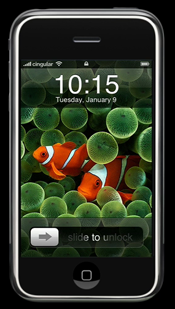Tech
What may sink the iPhone
I may be eating a lot of crow about my prediction that the iPhone was a red herring (it was announced after all) but that doesn't mean that I have to like it.


There are a lot of issues with iPhone as others have deftly pointed out, not the least of which are the facts that it doesn't have a removable battery, it's locked to a carrier, it's wicked expensive (when you consider that Apple's getting a ~US$100 kickback from Cingular on each unit sold) and the list goes on. But what may sink the iPhone is its lack of international roaming support.
My friend Ole put it best:
The iPhone certainly has a lot of "wow" factor and could well become as ground-breaking and popular as the iPod, as Bob Snow suggests. The use of an entirely software-based interface promises to give us allkinds of cool upgrades and enhancements (perhaps even third party ones?) over time.
So, what's the bad news?
First, this phone will not work in Japan because it does not support the crucial international 3G band, known as 2100MHz WCDMA, or UMTS.
Lack of 3G support also means less choices for roaming in Europe and other parts of Asia. Cingular will tell you they plan to offer 3G on 1900Mhz in the US, but this doesn't address the roaming issue. Of course, a "real" 3G phone would also have a camera on the USER side of the phone to allow for video-conferencing, but this concerns me lessthan the frequency issue.
Second, this phone will (at least initially) be offered only through a contract with Cingular which implies it will be SIM-locked. Frequent international travellers rely on the ability to purchase a local SIM card in the destination country. While Cingular may offer unlocking (if you ask and for a fee), this is not at all clear. Handsets are often sold (or given away) as part of contract deals with carriers, but it does not have to be this way. A lucrative market exists for folks who simply want to purchase a phone that "works everywhere".
Think about it. For the first time Apple has introduced a product that's initially only available in the US and only through a contract with one carrier. Wouldn't it have been better to launch the iPhone simultaneously all over the world and let the users choose carrier instead? The announcement about phones being available in Europe and Asia later implies that these units will have different frequency specifications, hopefully incorporating that crucial 3G band. One canonly hope that such a model differentiation does NOT come at the cost of another band, such as the US-only 850Mhz GSM band. Maybe Apple will realize that the iPhone, like the iPod is an international device. Aphone will only "work everywhere" if it has quad-band GSM and 3G.I live in hope.
For the record, since 2005, I've used two different handset models that support 3G and roamed on both VodaPhone Japan and DoCoMo. My carrier is Cingular. This works really well and is the only way you can roam in Japan since the other cellular networks there are incompatible with the rest of the world.
Bummer.